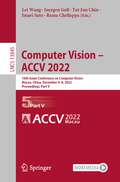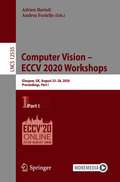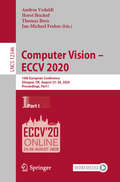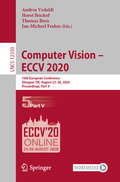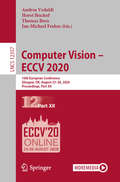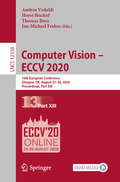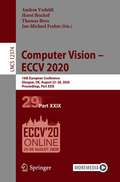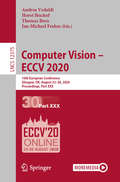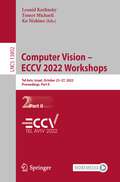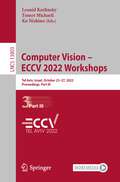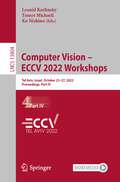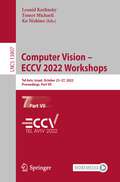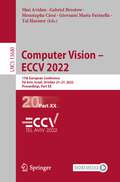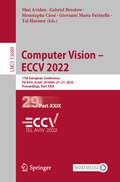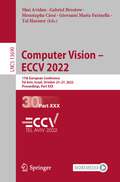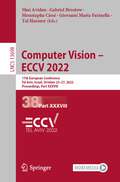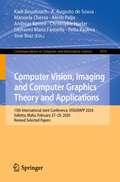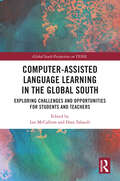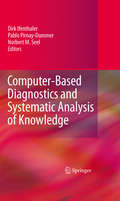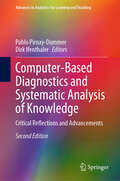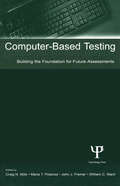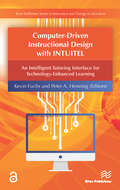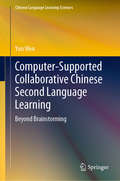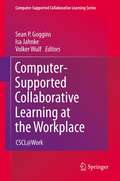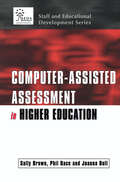- Table View
- List View
Computer Vision – ACCV 2022: 16th Asian Conference on Computer Vision, Macao, China, December 4–8, 2022, Proceedings, Part V (Lecture Notes in Computer Science #13845)
by Juergen Gall Rama Chellappa Lei Wang Imari Sato Tat-Jun ChinThe 7-volume set of LNCS 13841-13847 constitutes the proceedings of the 16th Asian Conference on Computer Vision, ACCV 2022, held in Macao, China, December 2022. The total of 277 contributions included in the proceedings set was carefully reviewed and selected from 836 submissions during two rounds of reviewing and improvement. The papers focus on the following topics: Part I: 3D computer vision; optimization methods; Part II: applications of computer vision, vision for X; computational photography, sensing, and display; Part III: low-level vision, image processing; Part IV: face and gesture; pose and action; video analysis and event recognition; vision and language; biometrics; Part V: recognition: feature detection, indexing, matching, and shape representation; datasets and performance analysis; Part VI: biomedical image analysis; deep learning for computer vision; Part VII: generative models for computer vision; segmentation and grouping; motion and tracking; document image analysis; big data, large scale methods.
Computer Vision – ECCV 2020 Workshops: Glasgow, UK, August 23–28, 2020, Proceedings, Part I (Lecture Notes in Computer Science #12535)
by Andrea Fusiello Adrien BartoliThe 6-volume set, comprising the LNCS books 12535 until 12540, constitutes the refereed proceedings of 28 out of the 45 workshops held at the 16th European Conference on Computer Vision, ECCV 2020. The conference was planned to take place in Glasgow, UK, during August 23-28, 2020, but changed to a virtual format due to the COVID-19 pandemic. The 249 full papers, 18 short papers, and 21 further contributions included in the workshop proceedings were carefully reviewed and selected from a total of 467 submissions. The papers deal with diverse computer vision topics. Part I focusses on adversarial robustness in the real world; bioimage computation; egocentric perception, interaction and computing; eye gaze in VR, AR, and in the wild; TASK-CV workshop and VisDA challenge; and bodily expressed emotion understanding.
Computer Vision – ECCV 2020: 16th European Conference, Glasgow, UK, August 23–28, 2020, Proceedings, Part I (Lecture Notes in Computer Science #12346)
by Thomas Brox Andrea Vedaldi Horst Bischof Jan-Michael FrahmThe 30-volume set, comprising the LNCS books 12346 until 12375, constitutes the refereed proceedings of the 16th European Conference on Computer Vision, ECCV 2020, which was planned to be held in Glasgow, UK, during August 23-28, 2020. The conference was held virtually due to the COVID-19 pandemic.The 1360 revised papers presented in these proceedings were carefully reviewed and selected from a total of 5025 submissions. The papers deal with topics such as computer vision; machine learning; deep neural networks; reinforcement learning; object recognition; image classification; image processing; object detection; semantic segmentation; human pose estimation; 3d reconstruction; stereo vision; computational photography; neural networks; image coding; image reconstruction; object recognition; motion estimation.
Computer Vision – ECCV 2020: 16th European Conference, Glasgow, UK, August 23–28, 2020, Proceedings, Part V (Lecture Notes in Computer Science #12350)
by Thomas Brox Andrea Vedaldi Horst Bischof Jan-Michael FrahmThe 30-volume set, comprising the LNCS books 12346 until 12375, constitutes the refereed proceedings of the 16th European Conference on Computer Vision, ECCV 2020, which was planned to be held in Glasgow, UK, during August 23-28, 2020. The conference was held virtually due to the COVID-19 pandemic.The 1360 revised papers presented in these proceedings were carefully reviewed and selected from a total of 5025 submissions. The papers deal with topics such as computer vision; machine learning; deep neural networks; reinforcement learning; object recognition; image classification; image processing; object detection; semantic segmentation; human pose estimation; 3d reconstruction; stereo vision; computational photography; neural networks; image coding; image reconstruction; object recognition; motion estimation.
Computer Vision – ECCV 2020: 16th European Conference, Glasgow, UK, August 23–28, 2020, Proceedings, Part XII (Lecture Notes in Computer Science #12357)
by Thomas Brox Andrea Vedaldi Horst Bischof Jan-Michael FrahmThe 30-volume set, comprising the LNCS books 12346 until 12375, constitutes the refereed proceedings of the 16th European Conference on Computer Vision, ECCV 2020, which was planned to be held in Glasgow, UK, during August 23-28, 2020. The conference was held virtually due to the COVID-19 pandemic.The 1360 revised papers presented in these proceedings were carefully reviewed and selected from a total of 5025 submissions. The papers deal with topics such as computer vision; machine learning; deep neural networks; reinforcement learning; object recognition; image classification; image processing; object detection; semantic segmentation; human pose estimation; 3d reconstruction; stereo vision; computational photography; neural networks; image coding; image reconstruction; object recognition; motion estimation.
Computer Vision – ECCV 2020: 16th European Conference, Glasgow, UK, August 23–28, 2020, Proceedings, Part XIII (Lecture Notes in Computer Science #12358)
by Thomas Brox Andrea Vedaldi Horst Bischof Jan-Michael FrahmThe 30-volume set, comprising the LNCS books 12346 until 12375, constitutes the refereed proceedings of the 16th European Conference on Computer Vision, ECCV 2020, which was planned to be held in Glasgow, UK, during August 23-28, 2020. The conference was held virtually due to the COVID-19 pandemic.The 1360 revised papers presented in these proceedings were carefully reviewed and selected from a total of 5025 submissions. The papers deal with topics such as computer vision; machine learning; deep neural networks; reinforcement learning; object recognition; image classification; image processing; object detection; semantic segmentation; human pose estimation; 3d reconstruction; stereo vision; computational photography; neural networks; image coding; image reconstruction; object recognition; motion estimation.
Computer Vision – ECCV 2020: 16th European Conference, Glasgow, UK, August 23–28, 2020, Proceedings, Part XXIX (Lecture Notes in Computer Science #12374)
by Thomas Brox Andrea Vedaldi Horst Bischof Jan-Michael FrahmThe 30-volume set, comprising the LNCS books 12346 until 12375, constitutes the refereed proceedings of the 16th European Conference on Computer Vision, ECCV 2020, which was planned to be held in Glasgow, UK, during August 23-28, 2020. The conference was held virtually due to the COVID-19 pandemic.The 1360 revised papers presented in these proceedings were carefully reviewed and selected from a total of 5025 submissions. The papers deal with topics such as computer vision; machine learning; deep neural networks; reinforcement learning; object recognition; image classification; image processing; object detection; semantic segmentation; human pose estimation; 3d reconstruction; stereo vision; computational photography; neural networks; image coding; image reconstruction; object recognition; motion estimation.
Computer Vision – ECCV 2020: 16th European Conference, Glasgow, UK, August 23–28, 2020, Proceedings, Part XXX (Lecture Notes in Computer Science #12375)
by Thomas Brox Andrea Vedaldi Horst Bischof Jan-Michael FrahmThe 30-volume set, comprising the LNCS books 12346 until 12375, constitutes the refereed proceedings of the 16th European Conference on Computer Vision, ECCV 2020, which was planned to be held in Glasgow, UK, during August 23-28, 2020. The conference was held virtually due to the COVID-19 pandemic.The 1360 revised papers presented in these proceedings were carefully reviewed and selected from a total of 5025 submissions. The papers deal with topics such as computer vision; machine learning; deep neural networks; reinforcement learning; object recognition; image classification; image processing; object detection; semantic segmentation; human pose estimation; 3d reconstruction; stereo vision; computational photography; neural networks; image coding; image reconstruction; object recognition; motion estimation.
Computer Vision – ECCV 2022 Workshops: Tel Aviv, Israel, October 23–27, 2022, Proceedings, Part II (Lecture Notes in Computer Science #13802)
by Ko Nishino Leonid Karlinsky Tomer MichaeliThe 8-volume set, comprising the LNCS books 13801 until 13809, constitutes the refereed proceedings of 38 out of the 60 workshops held at the 17th European Conference on Computer Vision, ECCV 2022. The conference took place in Tel Aviv, Israel, during October 23-27, 2022; the workshops were held hybrid or online.The 367 full papers included in this volume set were carefully reviewed and selected for inclusion in the ECCV 2022 workshop proceedings. They were organized in individual parts as follows: Part I: W01 - AI for Space; W02 - Vision for Art; W03 - Adversarial Robustness in the Real World; W04 - Autonomous Vehicle Vision Part II: W05 - Learning With Limited and Imperfect Data; W06 - Advances in Image Manipulation; Part III: W07 - Medical Computer Vision; W08 - Computer Vision for Metaverse; W09 - Self-Supervised Learning: What Is Next?; Part IV: W10 - Self-Supervised Learning for Next-Generation Industry-Level Autonomous Driving; W11 - ISIC Skin Image Analysis; W12 - Cross-Modal Human-Robot Interaction; W13 - Text in Everything; W14 - BioImage Computing; W15 - Visual Object-Oriented Learning Meets Interaction: Discovery, Representations, and Applications; W16 - AI for Creative Video Editing and Understanding; W17 - Visual Inductive Priors for Data-Efficient Deep Learning; W18 - Mobile Intelligent Photography and Imaging; Part V: W19 - People Analysis: From Face, Body and Fashion to 3D Virtual Avatars; W20 - Safe Artificial Intelligence for Automated Driving; W21 - Real-World Surveillance: Applications and Challenges; W22 - Affective Behavior Analysis In-the-Wild; Part VI: W23 - Visual Perception for Navigation in Human Environments: The JackRabbot Human Body Pose Dataset and Benchmark; W24 - Distributed Smart Cameras; W25 - Causality in Vision; W26 - In-Vehicle Sensing and Monitorization; W27 - Assistive Computer Vision and Robotics; W28 - Computational Aspects of Deep Learning; Part VII: W29 - Computer Vision for Civil and Infrastructure Engineering; W30 - AI-Enabled Medical Image Analysis: Digital Pathology and Radiology/COVID19; W31 - Compositional and Multimodal Perception; Part VIII: W32 - Uncertainty Quantification for Computer Vision; W33 - Recovering 6D Object Pose; W34 - Drawings and Abstract Imagery: Representation and Analysis; W35 - Sign Language Understanding; W36 - A Challenge for Out-of-Distribution Generalization in Computer Vision; W37 - Vision With Biased or Scarce Data; W38 - Visual Object Tracking Challenge.
Computer Vision – ECCV 2022 Workshops: Tel Aviv, Israel, October 23–27, 2022, Proceedings, Part III (Lecture Notes in Computer Science #13803)
by Ko Nishino Leonid Karlinsky Tomer MichaeliThe 8-volume set, comprising the LNCS books 13801 until 13809, constitutes the refereed proceedings of 38 out of the 60 workshops held at the 17th European Conference on Computer Vision, ECCV 2022. The conference took place in Tel Aviv, Israel, during October 23-27, 2022; the workshops were held hybrid or online.The 367 full papers included in this volume set were carefully reviewed and selected for inclusion in the ECCV 2022 workshop proceedings. They were organized in individual parts as follows: Part I: W01 - AI for Space; W02 - Vision for Art; W03 - Adversarial Robustness in the Real World; W04 - Autonomous Vehicle Vision Part II: W05 - Learning With Limited and Imperfect Data; W06 - Advances in Image Manipulation; Part III: W07 - Medical Computer Vision; W08 - Computer Vision for Metaverse; W09 - Self-Supervised Learning: What Is Next?; Part IV: W10 - Self-Supervised Learning for Next-Generation Industry-Level Autonomous Driving; W11 - ISIC Skin Image Analysis; W12 - Cross-Modal Human-Robot Interaction; W13 - Text in Everything; W14 - BioImage Computing; W15 - Visual Object-Oriented Learning Meets Interaction: Discovery, Representations, and Applications; W16 - AI for Creative Video Editing and Understanding; W17 - Visual Inductive Priors for Data-Efficient Deep Learning; W18 - Mobile Intelligent Photography and Imaging; Part V: W19 - People Analysis: From Face, Body and Fashion to 3D Virtual Avatars; W20 - Safe Artificial Intelligence for Automated Driving; W21 - Real-World Surveillance: Applications and Challenges; W22 - Affective Behavior Analysis In-the-Wild; Part VI: W23 - Visual Perception for Navigation in Human Environments: The JackRabbot Human Body Pose Dataset and Benchmark; W24 - Distributed Smart Cameras; W25 - Causality in Vision; W26 - In-Vehicle Sensing and Monitorization; W27 - Assistive Computer Vision and Robotics; W28 - Computational Aspects of Deep Learning; Part VII: W29 - Computer Vision for Civil and Infrastructure Engineering; W30 - AI-Enabled Medical Image Analysis: Digital Pathology and Radiology/COVID19; W31 - Compositional and Multimodal Perception; Part VIII: W32 - Uncertainty Quantification for Computer Vision; W33 - Recovering 6D Object Pose; W34 - Drawings and Abstract Imagery: Representation and Analysis; W35 - Sign Language Understanding; W36 - A Challenge for Out-of-Distribution Generalization in Computer Vision; W37 - Vision With Biased or Scarce Data; W38 - Visual Object Tracking Challenge.
Computer Vision – ECCV 2022 Workshops: Tel Aviv, Israel, October 23–27, 2022, Proceedings, Part IV (Lecture Notes in Computer Science #13804)
by Ko Nishino Leonid Karlinsky Tomer MichaeliThe 8-volume set, comprising the LNCS books 13801 until 13809, constitutes the refereed proceedings of 38 out of the 60 workshops held at the 17th European Conference on Computer Vision, ECCV 2022. The conference took place in Tel Aviv, Israel, during October 23-27, 2022; the workshops were held hybrid or online.The 367 full papers included in this volume set were carefully reviewed and selected for inclusion in the ECCV 2022 workshop proceedings. They were organized in individual parts as follows: Part I: W01 - AI for Space; W02 - Vision for Art; W03 - Adversarial Robustness in the Real World; W04 - Autonomous Vehicle Vision Part II: W05 - Learning With Limited and Imperfect Data; W06 - Advances in Image Manipulation; Part III: W07 - Medical Computer Vision; W08 - Computer Vision for Metaverse; W09 - Self-Supervised Learning: What Is Next?; Part IV: W10 - Self-Supervised Learning for Next-Generation Industry-Level Autonomous Driving; W11 - ISIC Skin Image Analysis; W12 - Cross-Modal Human-Robot Interaction; W13 - Text in Everything; W14 - BioImage Computing; W15 - Visual Object-Oriented Learning Meets Interaction: Discovery, Representations, and Applications; W16 - AI for Creative Video Editing and Understanding; W17 - Visual Inductive Priors for Data-Efficient Deep Learning; W18 - Mobile Intelligent Photography and Imaging; Part V: W19 - People Analysis: From Face, Body and Fashion to 3D Virtual Avatars; W20 - Safe Artificial Intelligence for Automated Driving; W21 - Real-World Surveillance: Applications and Challenges; W22 - Affective Behavior Analysis In-the-Wild; Part VI: W23 - Visual Perception for Navigation in Human Environments: The JackRabbot Human Body Pose Dataset and Benchmark; W24 - Distributed Smart Cameras; W25 - Causality in Vision; W26 - In-Vehicle Sensing and Monitorization; W27 - Assistive Computer Vision and Robotics; W28 - Computational Aspects of Deep Learning; Part VII: W29 - Computer Vision for Civil and Infrastructure Engineering; W30 - AI-Enabled Medical Image Analysis: Digital Pathology and Radiology/COVID19; W31 - Compositional and Multimodal Perception; Part VIII: W32 - Uncertainty Quantification for Computer Vision; W33 - Recovering 6D Object Pose; W34 - Drawings and Abstract Imagery: Representation and Analysis; W35 - Sign Language Understanding; W36 - A Challenge for Out-of-Distribution Generalization in Computer Vision; W37 - Vision With Biased or Scarce Data; W38 - Visual Object Tracking Challenge.
Computer Vision – ECCV 2022 Workshops: Tel Aviv, Israel, October 23–27, 2022, Proceedings, Part VII (Lecture Notes in Computer Science #13807)
by Ko Nishino Leonid Karlinsky Tomer MichaeliThe 8-volume set, comprising the LNCS books 13801 until 13809, constitutes the refereed proceedings of 38 out of the 60 workshops held at the 17th European Conference on Computer Vision, ECCV 2022. The conference took place in Tel Aviv, Israel, during October 23-27, 2022; the workshops were held hybrid or online.The 367 full papers included in this volume set were carefully reviewed and selected for inclusion in the ECCV 2022 workshop proceedings. They were organized in individual parts as follows: Part I: W01 - AI for Space; W02 - Vision for Art; W03 - Adversarial Robustness in the Real World; W04 - Autonomous Vehicle Vision Part II: W05 - Learning With Limited and Imperfect Data; W06 - Advances in Image Manipulation; Part III: W07 - Medical Computer Vision; W08 - Computer Vision for Metaverse; W09 - Self-Supervised Learning: What Is Next?; Part IV: W10 - Self-Supervised Learning for Next-Generation Industry-Level Autonomous Driving; W11 - ISIC Skin Image Analysis; W12 - Cross-Modal Human-Robot Interaction; W13 - Text in Everything; W14 - BioImage Computing; W15 - Visual Object-Oriented Learning Meets Interaction: Discovery, Representations, and Applications; W16 - AI for Creative Video Editing and Understanding; W17 - Visual Inductive Priors for Data-Efficient Deep Learning; W18 - Mobile Intelligent Photography and Imaging; Part V: W19 - People Analysis: From Face, Body and Fashion to 3D Virtual Avatars; W20 - Safe Artificial Intelligence for Automated Driving; W21 - Real-World Surveillance: Applications and Challenges; W22 - Affective Behavior Analysis In-the-Wild; Part VI: W23 - Visual Perception for Navigation in Human Environments: The JackRabbot Human Body Pose Dataset and Benchmark; W24 - Distributed Smart Cameras; W25 - Causality in Vision; W26 - In-Vehicle Sensing and Monitorization; W27 - Assistive Computer Vision and Robotics; W28 - Computational Aspects of Deep Learning; Part VII: W29 - Computer Vision for Civil and Infrastructure Engineering; W30 - AI-Enabled Medical Image Analysis: Digital Pathology and Radiology/COVID19; W31 - Compositional and Multimodal Perception; Part VIII: W32 - Uncertainty Quantification for Computer Vision; W33 - Recovering 6D Object Pose; W34 - Drawings and Abstract Imagery: Representation and Analysis; W35 - Sign Language Understanding; W36 - A Challenge for Out-of-Distribution Generalization in Computer Vision; W37 - Vision With Biased or Scarce Data; W38 - Visual Object Tracking Challenge.
Computer Vision – ECCV 2022: 17th European Conference, Tel Aviv, Israel, October 23–27, 2022, Proceedings, Part XX (Lecture Notes in Computer Science #13680)
by Giovanni Maria Farinella Tal Hassner Shai Avidan Gabriel Brostow Moustapha CisséThe 39-volume set, comprising the LNCS books 13661 until 13699, constitutes the refereed proceedings of the 17th European Conference on Computer Vision, ECCV 2022, held in Tel Aviv, Israel, during October 23–27, 2022. The 1645 papers presented in these proceedings were carefully reviewed and selected from a total of 5804 submissions. The papers deal with topics such as computer vision; machine learning; deep neural networks; reinforcement learning; object recognition; image classification; image processing; object detection; semantic segmentation; human pose estimation; 3d reconstruction; stereo vision; computational photography; neural networks; image coding; image reconstruction; object recognition; motion estimation.
Computer Vision – ECCV 2022: 17th European Conference, Tel Aviv, Israel, October 23–27, 2022, Proceedings, Part XXIX (Lecture Notes in Computer Science #13689)
by Giovanni Maria Farinella Tal Hassner Shai Avidan Gabriel Brostow Moustapha CisséThe 39-volume set, comprising the LNCS books 13661 until 13699, constitutes the refereed proceedings of the 17th European Conference on Computer Vision, ECCV 2022, held in Tel Aviv, Israel, during October 23–27, 2022. The 1645 papers presented in these proceedings were carefully reviewed and selected from a total of 5804 submissions. The papers deal with topics such as computer vision; machine learning; deep neural networks; reinforcement learning; object recognition; image classification; image processing; object detection; semantic segmentation; human pose estimation; 3d reconstruction; stereo vision; computational photography; neural networks; image coding; image reconstruction; object recognition; motion estimation.
Computer Vision – ECCV 2022: 17th European Conference, Tel Aviv, Israel, October 23–27, 2022, Proceedings, Part XXX (Lecture Notes in Computer Science #13690)
by Giovanni Maria Farinella Tal Hassner Shai Avidan Gabriel Brostow Moustapha CisséThe 39-volume set, comprising the LNCS books 13661 until 13699, constitutes the refereed proceedings of the 17th European Conference on Computer Vision, ECCV 2022, held in Tel Aviv, Israel, during October 23–27, 2022. The 1645 papers presented in these proceedings were carefully reviewed and selected from a total of 5804 submissions. The papers deal with topics such as computer vision; machine learning; deep neural networks; reinforcement learning; object recognition; image classification; image processing; object detection; semantic segmentation; human pose estimation; 3d reconstruction; stereo vision; computational photography; neural networks; image coding; image reconstruction; object recognition; motion estimation.
Computer Vision – ECCV 2022: 17th European Conference, Tel Aviv, Israel, October 23–27, 2022, Proceedings, Part XXXVIII (Lecture Notes in Computer Science #13698)
by Giovanni Maria Farinella Tal Hassner Shai Avidan Gabriel Brostow Moustapha CisséThe 39-volume set, comprising the LNCS books 13661 until 13699, constitutes the refereed proceedings of the 17th European Conference on Computer Vision, ECCV 2022, held in Tel Aviv, Israel, during October 23–27, 2022. The 1645 papers presented in these proceedings were carefully reviewed and selected from a total of 5804 submissions. The papers deal with topics such as computer vision; machine learning; deep neural networks; reinforcement learning; object recognition; image classification; image processing; object detection; semantic segmentation; human pose estimation; 3d reconstruction; stereo vision; computational photography; neural networks; image coding; image reconstruction; object recognition; motion estimation.
Computer Vision, Imaging and Computer Graphics Theory and Applications: 15th International Joint Conference, VISIGRAPP 2020 Valletta, Malta, February 27–29, 2020, Revised Selected Papers (Communications in Computer and Information Science #1474)
by Petia Radeva Giovanni Maria Farinella Andreas Kerren Christophe Hurter Manuela Chessa Kadi Bouatouch Alexis Paljic A. Augusto de Sousa Jose BrazThis book constitutes thoroughly revised and selected papers from the 15th International Joint Conference on Computer Vision, Imaging and Computer Graphics Theory and Applications, VISIGRAPP 2020, held in Valletta, Malta, in February 2020.The 25 thoroughly revised and extended papers presented in this volume were carefully reviewed and selected from 455 submissions. The papers contribute to the understanding of relevant trends of current research on computer graphics; human computer interaction; information visualization; computer vision.
Computer-Assisted Language Learning in the Global South: Exploring Challenges and Opportunities for Students and Teachers (Global South Perspectives on TESOL)
by Lee McCallum and Dara TafazoliThis cross-cultural edited volume presents a rich tapestry of experiences, challenges, and innovations, focusing on assessment, course and curriculum design, approaches to pedagogy and teacher professional development in computer-assisted language learning (CALL) in the Global South.Comprising chapters from a broad swathe of international contexts, the book presents varied themes in CALL such as inclusion and social justice, artificial intelligence, barriers to online language teaching, skills-based practices, and professional development. By shedding light on the underrepresented research contexts in the Global South, a number of current innovations in these contexts at theoretical and empirical levels are showcased, resulting in a highly novel and cutting-edge volume that gives voice to perspectives on the implementation of CALL in less-privileged countries.Providing comparative research and innovative ways in which CALL can be harnessed in less-privileged contexts despite lack of resources in some cases, this book will appeal to scholars, researchers, and postgraduate students in the fields of technology in education, language and linguistics, as well as open and distance education and eLearning. CALL and TESOL educators may also benefit from the book.
Computer-Based Diagnostics and Systematic Analysis of Knowledge
by Norbert M. Seel Dirk Ifenthaler Pablo Pirnay-DummerWhat is knowledge? How can it be successfully assessed? How can we best use the results? As questions such as these continue to be discussed and the learning sciences continue to deal with expanding amounts of data, the challenge of applying theory to diagnostic methods takes on more complexity. Computer-Based Diagnostics and Systematic Analysis of Knowledge meets this challenge head-on as an international panel of experts reviews current and emerging assessment methodologies in the psychological and educational arenas. Emphasizing utility, effectiveness, and ease of interpretation, contributors critically discuss practical innovations and intriguing possibilities (including mental representations, automated knowledge visualization, modeling, and computer-based feedback) across fields ranging from mathematics education to medicine. These contents themselves model the steps of systematic inquiry, from theoretical construct to real-world application: Historical and theoretical foundations for the investigation of knowledge Current opportunities for understanding knowledge empirically Strategies for the aggregation and classification of knowledge Tools and methods for comparison and empirical testing Data interfaces between knowledge assessment tools Guidance in applying research results to particular fields Researchers and professionals in education psychology, instructional technology, computer science, and linguistics will find Computer-Based Diagnostics and Systematic Analysis of Knowledge a stimulating guide to a complex present and a rapidly evolving future.
Computer-Based Diagnostics and Systematic Analysis of Knowledge: Critical Reflections and Advancements (Advances in Analytics for Learning and Teaching)
by Dirk Ifenthaler Pablo Pirnay-DummerThis volume explores the rapidly advancing field of technology-supported knowledge assessment. Across academia, research on learning and instruction, AI-based analysis, psychology, and education, there is a pressing need for a comprehensive collection of foundations and methodologies related to knowledge. While the market offers books on individual and locally developed methods, a holistic overview is currently lacking. It aims to fill that gap, inspiring projects globally and benefiting knowledge-intensive developments in both digital and traditional learning environments. Understanding the state and processes of knowledge often poses a bottleneck in the quality of designs and implementations. This book addresses this challenge by focusing on mostly automated, easy-to-implement strategies, supporting the crucial task of understanding knowledge.
Computer-Based Testing: Building the Foundation for Future Assessments
by John J. Fremer Craig N. Mills Maria T. Potenza William C. WardAlthough computer-based tests (CBT) have been administered for many years, improvements in the speed and power of computers coupled with reductions in their cost have made large-scale computer delivery of tests increasingly feasible. CBT is now a common form of test delivery for licensure, certification, and admissions tests. Many large-scale, high-stakes testing programs have introduced CBT either as an option or as the sole means of test delivery. Although this movement to CBT has, to a great extent, been successful, it has not been without problems. Advances in psychometrics are required to ensure that those who rely on test results can have at least the same confidence in CBTs as they have in traditional forms of assessment. This volume stems from an ETS-sponsored colloquium in which more than 200 measurement professionals from eight countries and 29 states convened to assess the current and future status of CBT. The formal agenda for the colloquium was divided into three major segments: Test Models, Test Administration, and Test Analysis and Scoring. Each segment consisted of several presentations followed by comments from noted psychometricians and a break-out session in which presenters and discussants identified important issues and established priorities for a CBT research agenda. This volume contains the papers presented at the colloquium, the discussant remarks based on those papers, and the research agenda that was generated from the break-out sessions. Computer-Based Testing: Building the Foundation for Future Assessments is must reading for professionals, scholars, and advanced students working in the testing field, as well as people in the information technology field who have an interest in testing.
Computer-Driven Instructional Design with INTUITEL
by Kevin Fuchs Peter A. HenningINTUITEL is a research project that was co-financed by the European Commission with the aim to advance state-of-the-art e-learning systems via addition of guidance and feedback for learners. Through a combination of pedagogical knowledge, measured learning progress and a broad range of environmental and background data, INTUITEL systems will provide guidance towards an optimal learning pathway. This allows INTUITEL-enabled learning management systems to offer learners automated, personalised learning support so far only provided by human tutors INTUITEL is - in the first place - a design pattern for the creation of adaptive e-learning systems. It focuses on the reusability of existing learning material and especially the annotation with semantic meta data. INTUITEL introduces a novel approach that describes learning material as well as didactic and pedagogical meta knowledge by the use of ontologies. Learning recommendations are inferred from these ontologies during runtime. This way INTUITEL solves a common problem in the field of adaptive systems: it is not restricted to a certain field. Any content from any domain can be annotated. The INTUITEL research team also developed a prototype system. Both the theoretical foundations and how to implement your own INTUITEL system are discussed in this book.
Computer-Supported Collaborative Chinese Second Language Learning: Beyond Brainstorming (Chinese Language Learning Sciences)
by Yun WenThis book explores the implementation of an online representational tool, GroupScribbles, in Chinese-as-a-second-language classrooms from primary school to secondary school. It demonstrates the effectiveness of combining online representational tools with face-to-face classroom learning, and provides a workable approach to analysing interactions interweaving social and cognitive dimensions, which take place in the networked classroom. A series of suggestions regarding networked second language learning will help educators effectively implement information and communication technology tools in the classroom.
Computer-Supported Collaborative Learning at the Workplace: CSCL@Work (Computer-Supported Collaborative Learning Series #14)
by Volker Wulf Isa Jahnke Sean P. GogginsThis book is an edited volume of case studies exploring the uptake and use of computer supported collaborative learning in work settings. This book fills a significant gap in the literature. A number of existing works provide empirical research on collaborative work practices (Lave & Wenger, 1987; Davenport, 2005), the sharing of information at work (Brown & Duguid, 2000), and the development of communities of practice in workplace settings (Wenger, 1998). Others examine the munificent variation of information and communication technology use in the work place, including studies of informal social networks, formal information distribution and other socio-technical combinations found in work settings (Gibson & Cohen, 2003). Another significant thread of prior work is focused on computer supported collaborative learning, much of it investigating the application of computer support for learning in the context of traditional educational institutions, like public schools, private schools, colleges and tutoring organizations. Exciting new theories of how knowledge is constructed by groups (Stahl, 2006), how teachers contribute to collaborative learning (reference to another book in the series) and the application of socio-technical scripts for learning is explicated in book length works on CSCL. Book length empirical work on CSCW is widespread, and CSCL book length works are beginning to emerge with greater frequency. We distinguish CSCL at Work from prior books written under the aegis of training and development, or human resources more broadly. The book aims to fill a void between existing works in CSCW and CSCL, and will open with a chapter characterizing the emerging application of collaborative learning theories and practices to workplace learning. CSCL and CSCW research each make distinct and important contributions to the construction of collaborative workplace learning.
Computer-assisted Assessment of Students (SEDA Series)
by Phil Race Sally Brown Joanna BullThis text draws on a range of expertise to share good practice and explore new ways of using appropriate technologies in assessment. It provides a strategic overview along with pragmatic proposals for the use of computers in assessment.
